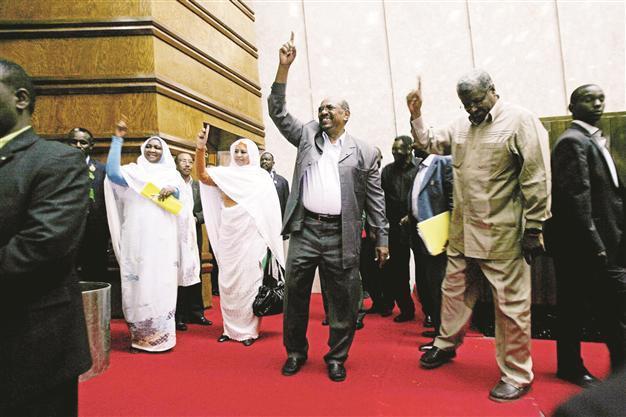Protests in Sudan are no ‘Arab Spring’: Al-Bashir
KHARTOUM

Sudanese President al-Bashir (C) arrives at Khartoum’s Friendship Hall to address a working women’s state organization. Al-Bashir criticized the recent protests. AFP photo
Nine days of country-wide protests against high prices in Sudan are no “Arab Spring,” President Omar al-Bashir said June 24, referring to a series of uprisings against regional strongmen.“The people who burn the tyres are small in number and they are pushing for a fight,” he told about 1,000 Sudanese students, suggesting that someone was behind protests in his country. Anti-regime demonstrations have widened since al-Bashir on June 18 announced austerity measures including tax hikes and a phasing out of fuel subsidies to prop up the country’s ailing finances.
“They said these economic measures would be a chance for an Arab Spring in Sudan. But the Arab Spring in Sudan happened many times already,” Agence France-Presse quoted him as saying, referring to previous uprisings by “all” the country’s people. Popular uprisings have overthrown military rulers in Sudan twice since the country gained independence from Britain in 1956 - once in 1964 and again in 1985. But al-Bashir said he himself remains popular.
Tour with open car
He said he took an “open car” around Khartoum last week, when smoke hung over the city from burning tyres, as residents of many neighborhoods clashed with police and denounced the regime and high food prices. “When the people saw me they shouted ‘Allahu akbar’,” al-Bashir said.
The protests over rising prices started with students outside the University of Khartoum. But they broadened to include a cross-section of the population in numerous locations throughout the capital, and several other parts of the country. Police responded with tear gas and batons, in what has become the standard reaction by security forces since demonstrations began on June 16 in Khartoum.
Al-Bashir, an army officer who seized power on June 30, 1989, withstood earlier student-led protests by thousands of people objecting to high prices in 1994. Though smaller in size, the current protests have occurred continuously for more than a week, with citizens blockading streets and throwing stones at police. Inflation has risen each month, hitting 30.4 percent in May, before Finance Minister Ali Mahmud al-Rasul announced last week a jump of about 50 percent in the price of petrol. Bankrupt Sudan has lost billions of dollars in oil receipts since South Sudan gained independence last July, leaving the north struggling for revenue, plagued by inflation, and with a severe shortage of dollars to pay for imports.
















